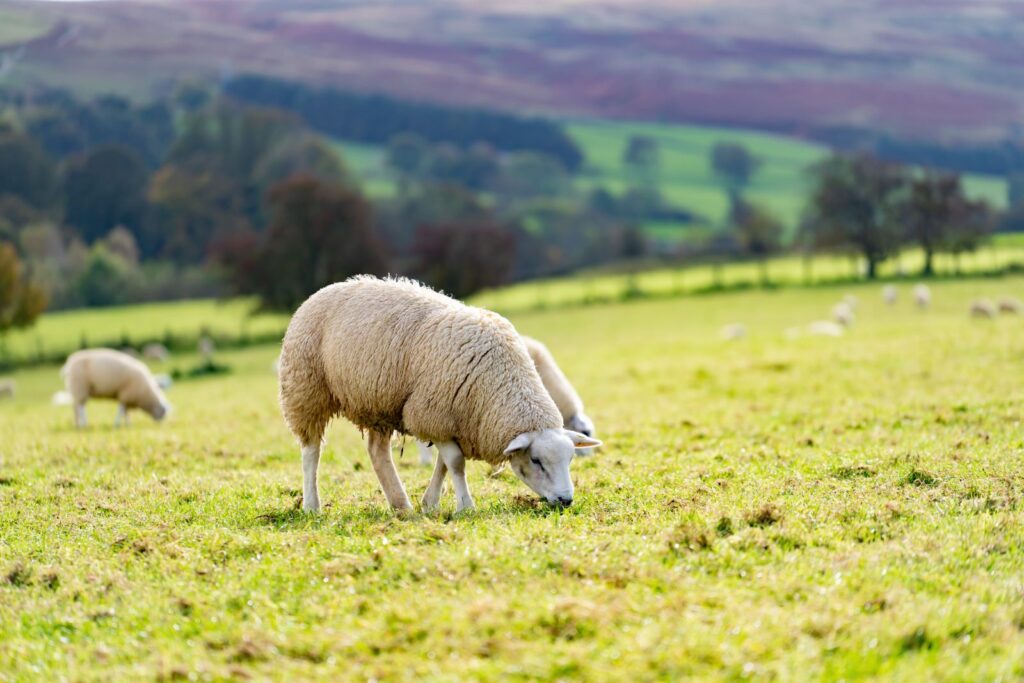Defra launches industry-wide R&D project to breed low methane sheep
4th July 2023
A new initiative to breed sheep with naturally low methane emissions has been awarded £2.9m funding through Defra’s Farming Innovation Programme and will see farmers, researchers and businesses come together to make a positive contribution to UK agriculture’s journey towards net zero.
The three-year project, called Breed for CH4nge – Breeding Low Methane Sheep, will involve measuring methane emissions from a total of 13,500 sheep in 45 flocks and collecting the necessary data to build and develop the tools required to genetically reduce emissions.
The project is also hoped to demonstrate the impact of low-carbon sheep on whole farm carbon footprints.
Led by sheep breeding technologies supplier Innovis, the initiative promotes widespread collaboration between industry and research organisations to deliver the objectives of the project.
Innovis will work in partnership with other performance-recording maternal sheep breeder groups to carry out the research and host on-farm events, including the Sheep Improvement Group (SIG), breeding the Exlana, Performance Recorded Lleyn Breeders (PRLB) and the Centurion Group of Dorset Sheep Breeders.
Meanwhile, scientific input, technology and additional genetics expertise will be provided by Scotland’s Rural College (SRUC) and Harper Adams University, while Signet Breeding Services, part of AHDB, will provide performance recording services.
Whereas, industry and supply chain partners, such as Centre for Innovation Excellence in Livestock (CIEL) and Pilgrims Pride and Waitrose, will help steer farm system modelling including the use of carbon calculators and will drive an integrated knowledge exchange (KE) programme.
Also partnering on the project, the National Sheep Association (NSA) will provide a direct and important link with the wider industry and a ‘guiding hand’ regarding policy issues.
Innovis chief executive, Dewi Jones commented: “This partnership unifies us with academics, key lamb supply-chain and industry bodies whose networks extend to thousands of English and other UK based sheep farmers.
“We’ve all delivered many successful projects, applied research results on-farm and communicated with a wide audience but never before combined forces; Breed for CH4nge will consequently build on and strengthen existing relationships.”
Project design and execution
The project will initially develop on-farm protocols and use new innovative tools and technologies, including Portable Accumulation Chambers (PAC) to predict methane emissions from grazing sheep, alongside measures of health, production and efficiency traits at the individual animal level.
Further measurements, including rumen size and microbiota, will improve understanding of the underlying biology and ensure that reductions in methane emissions positively contribute to sustainable genetic improvement of ewe productivity on UK grass and forage.
This comprehensive set of information will enable understanding of the genetic control of these characteristics and DNA sampling will allow relationships with the underlying genome of the sheep to be investigated. This will result in tools to compare the breeding value of sheep in the flocks, identifying breeding stock that will contribute to improving farm carbon footprint.
To widen the impact of the project, there are plans to roll out a far-reaching communication programme with other sheep breeders and farmers throughout England, in collaboration with supply chain partners and wider industry bodies, including NSA.
The initiative will be designed to identify the most effective ways of communicating the project’s outputs and implications to other farmers and help support them to make genetic changes.
Working towards wider net zero targets
Commenting on the project launch, Dr Mark Young from CIEL highlighted the importance of modern genetic tools in allowing scientists to investigate hard-to-measure traits like methane production to then incorporate findings into balanced breeding programmes.
“The wider breeding programmes that Innovis, SIG, PRLB and Centurion run use such tools very effectively so they are well-placed to reduce emissions and improve the efficiency of sheep production using genetics. This is greatly needed to meet our net zero aspirations,” he said.
SRUC’s Nicola Lambe added: “This project will build on international research on breeding to reduce methane emissions from sheep, to the point of industry implementation in UK flocks.
“The range of data being collected in this project will let us look at relationships of methane emissions with other traits that are important for productivity and sustainability of UK maternal sheep flocks. This will enable us to design the most appropriate breeding programme to reduce methane emissions from profitable sheep.”
NSA chief executive Phil Stocker said the project has great potential in moving the sheep industry forward by increasing productivity gains while reducing the sector’s carbon footprint, which are goals aligned with the challenges currently facing British farmers.
“We have to move faster in terms of farming being a solution to climate change, and play our part in Britain’s 30% methane reduction by 2030 targets agreed during COP 26,” he stressed.
“Through this work the consortium will identify ways to reduce our emissions but also ensure we do this in a way that maintains the wide range of sustainability traits inherent in many of our flocks.
Matt Penfold from Waitrose, which is also involved in the project, commented: “Sheep make an important contribution to the British countryside and if we can farm them more sustainably, then the project outcomes could have a very significant environmental benefit.
“Our involvement in this project is part of our wider net-zero science-based targets which will see us reach these aims within our British supply chains by 2035.”
Dewi Jones from Innovis added the ultimate goal of the project is to employ genetic science and breeding technologies to further improve the sustainability of UK sheep.
“Combine with the integrated knowledge exchange programme, and we have an initiative that will ultimately reduce flock carbon footprint, help improve sheep farmers’ productivity, sustainability, resilience and profitability,” he concluded.

